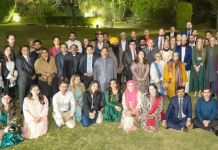ISLAMABAD, APR 4 (DNA) – The private sector has a critical role in the growth of the economy. There, the Punjab government is looking forward to receiving proposals from the business community prior to finalizing the provincial budget for the next financial year. Dr Erfa Iqbal, CEO, Punjab Board of Investment and Trade (PBIT) said this during a pre-budget digital consultation on better business regulations jointly organised by Sustainable Development Policy Institute (SDPI) and National Textile University Faisalabad.
Dr Erfa added further that all sectors of the economy need to come up with specific suggestions about taxes, business facilitation, access to infrastructure, investments, and other related aspects of doing business.
Rector National Textile University, Dr Tanveer Hussain emphasized that the prosperity of a country is dependent on industrialization. In Pakistan, textile industry plays a pivotal role despite the turn out of the exports has been low during last ten years. He said that we need to focus on value addition and reliance on renewable energy in addition to improving research & development.
Regional Coordinator, Small and Medium Enterprise Development Authority, Mr Shaban Khalid, was of view that ease of doing business in Pakistan is required and thus, SMEDA is playing a crucial role in this arena. All Chambers of Commerce and Industries are requested to highlight their capacity building needs, he added.
Dr Vaqar, Joint Executive Director, SDPI, highlighted the fact that the upcoming federal budget will be formulated under difficult circumstances as government’s resources are overly stretched due to pandemic-related spending. Therefore, the private sector needs to play a role in building back better.
“Textile sector will play an important role in supporting Pakistan’s balance of payments and its exports will be much needed to help post-pandemic economic recovery,” Dr Ahmed said and added further that a timely regulatory impact assessment could then help rationalize various obsolete regulations which are leading to high costs for the businesses.
Mian Zafar Iqbal, Chief Executive Officer, Faisalabad Chamber of Small Traders & Small Industry, was of opinion that the fear of harassment in the business circle by tax authorities can only be redressed by more comprehensive public private dialogue.
Head of Association of Chartered Certified Accountants Pakistan, Mr Sajjeed Aslam, was of view that we need to look at the entire value chain of textile which starts from agriculture. Moreover, the focus should be on developing a framework while movingfrom short term to a medium, and longer term reform plan.
Mr Awais, Council Member, Institute of Chartered Accountants of Pakistan, on the occasion opined that the taxation structure in Pakistan is very complex for industries, particularly for SMEs. He said that reduction of tax is required as in some cases, 40-50% of incomes are being paid in taxes.
Dr Sajid Amin, Head of Policy Solutions Lab at SDPI, was of view that the economic recovery is largely dependent on fiscal stimulus and support to SMEs.=DNA
=============

















